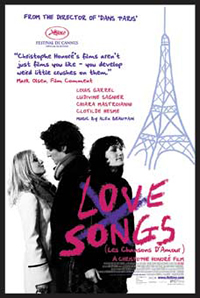Love Songs (Christophe Honore)
This will sound completely cheesy, but I am in love with the film “Love Songs,” from the musical jewels and cinematography of its main character, Paris, to the incredibly stylistic characters with all their flaws and incessant smoking. You want to be there, being a voyeur in person as the story unfolds.
The story in “Love Songs” is broken into three pieces, or chapters; in a sense, a three part play with a backdrop of the world its characters live and die in. Adding to the texture of the film are beautiful and hypnotic French pop songs the likes of Autour de Lucie, with lyrics that are just as exquisite as their notes.
Ismaël, played by the incredibly sexy Louis Garrel, is the kind of man women fall in love with and wish they hadn’t. In an argument, even when anger is firing on all pistons, his coy sense of humor will always get him out of a bind. In a sense, he’s completely infuriating. But his passion and boyish charm makes it impossible to say no or stay mad.
Julie (Ludivine Sagnier), his girlfriend, is dealing with this dilemma, and as an attempt to change things up a bit, they both invite Ismaël’s co-worker, Alice, to join them in bed. But Alice’s focus is mainly on Julie’s charms and a no-intercourse regimen, leaving Ismaël as a third wheel, which is kind of funny.
This doesn’t seem to bring the result the Julie was looking for, possibly because she’s not quite sure what she wants, and her man has an even lesser clue. But they hash things out as best they can through song. If only we could all argue with songs like “Je n’aime Que Toi.”
Julie is very close to her family, who has taken Ismaël in as their own, and during a family dinner Julie’s mother (Brigitte Roüan) overhears Julie telling her sister about the threesome arrangement she’s been experiencing. In true French fashion, her mother isn’t really shocked when she talks to her daughter one-on-one, but is more curious about the situation in a matter-of-fact way, right down to the way it all happens in bed.
When things between the couple are finally beginning to come back together, the unthinkable happens. Julie dies suddenly as the end to the first act, and we understand why it is called “Departure.”
It is at this time that the essence of the film’s color palate comes to light; a wondrous array of blue and silver hues, which meld with the water element felt in the song’s lyrics, the rain of Paris, and the tears Julie’s death.
Going into “Absence,” the whole family is reeling, and Ismaël is walking through the days that follow, numb and in a haze. Julie’s older sister, Jeanne (Chiara Mastroianni), decides she wants them to “work together” to deal with their grief by essentially moving into the apartment the couple shared.
But her moves are denied by Ismaël, who seeks refuge wherever else he can get it. As an escape and a place to sleep, he bunks at the apartment of a new man that Alice has taken up with, Gwendal (Yannick Renier). In the process, Ismaël meets Gwendal little brother, Erwann (Grégoire Leprince-Ringuet), who develops a lust at first sight, puppy dog crush on Ismaël.
In the end Ismaël walks the line of allowing himself to grieve the loss of his beloved while also delving into distraction. Although music plays a large part in this film, it is the city that haunts Ismaël, not a song on the radio, as he relives his moments with Julie.
The soundtrack Love Songs (Les Chansons d’Amour) was written by Alex Beaupain who also performs the song “Brooklyn Bridge,” in the film. The album is available on the French label, Naïve, and can be found on Amazon.com, both in physical and MP3 download format.

